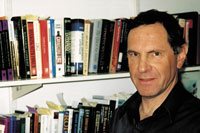
Frank Horwitz
This is according to Professor Frank Horwitz, Director of the UCT Graduate School of Business, who says there are innovative ways that HR can boost competitiveness.
Horwitz, who will in November run a course Building Strategic Readiness through People at the UCT GSB, said the South African clothing industry is just one example where these challenges have radically affected the success of South African companies recently.
He recommends that, in the face of mounting global competition, South African HR professionals ask themselves some fundamental questions about their contributions to the business.
Professor Horwitz said there are a few basic ways for HR to start adding more value to the business.
"The first thing HR professionals can do is to look at how their organisation attract, motivate and retain human capital - especially intellectual capital - as this is a key component of competitive advantage," he said.
"And to enhance this element, they need to focus on differentiation. This put simply is creating an employer brand where the labour market will perceive your company as an employer of choice. You must offer a distinctive employment deal with value adding practices, a stretching and performance-driven culture and engaged people - put together in a way that can't easily be replicated by your competitors."
Secondly, Horwitz recommends that HR people turn their attention to the external market - this means that HR must go far beyond the traditional two-way relationship between management and employees.
"An external market approach demands that HR people align whatever they do inside the company and how they do it to ensure that a customer will buy and keep buying the company's products or services," he said.
"This 'customer alignment' can be seen in leading retail firms like Pick n' Pay. Their employee development is key and plays an integral part of the organisation's good customer service."
Similarly, an external market approach means aligning other key activities with the business strategy. Horwitz advises that HR plays a bigger role in identifying potential leaders and in developing them, and in ensuring that performance management and rewards systems are aligned explicitly to the values of the business objectives and priorities.
Thirdly, he recommends that HR people measure key factors in the value chain. "It is important to know where value is created in the organisation, and this includes the measuring of human capital performance," he said.
To promote this level of innovation, he added that business schools have a role to play and need to offer more strategic HR programmes.
"Universities and technikons are doing a relatively sound job of the maintenance, systems and consulting roles in professional HR development, but business schools need to step up in developing strategic thinking capabilities," he said.
"The profession urgently needs people who are passionate - not just visionaries, but missionaries. It is the missionaries who will make things happen."
Professor Horwitz's course on 15-17 November is a very successful programme that explores current international human resource practices to ensure the alignment of HR practice with business strategy.
For details contact Junita on (021) 406 1323 or email .